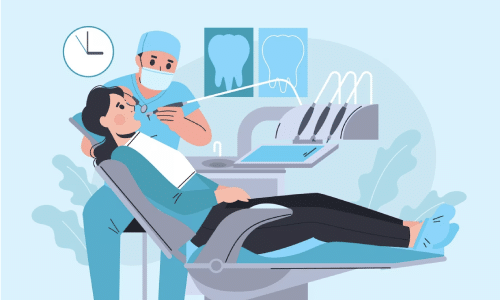Root Canal for Children: When Is It Necessary and What to Expect
Sometimes, a child can experience a severe tooth infection or damage. In such situations, a pediatric dentist might recommend a root canal treatment or pulpectomy to save the tooth.
Have you been recently told that your child needs to undergo a root canal procedure? Or are you struggling to decide whether opting for a root canal is a better choice than extracting the tooth?
Continue reading this blog about root canals in children to grasp the significance of opting for a root canal for children and to gain insight into what you can expect from the root canal procedure.
What is a Root Canal for Children?
A root canal is a surgical procedure performed by a pediatric root canal specialist or endodontist to remove the affected pulp from the child’s tooth. The pulp is the innermost tissue of the tooth that comprises the nerves and blood vessels that fill the tooth roots. It can be done on both permanent and temporary/milk teeth to save the natural tooth and prevent it from falling out soon.
Is it Necessary for Children to Get Root Canal Therapy?
This is a relevant question that must be asked of the pediatric dentist.
The necessity for children to undergo root canal therapy on their baby teeth cannot be determined in a manner that covers all things in consideration. There are unique circumstances in every case. Therefore, consulting a pediatric dentist is the best way to know if the root canal surgery is avoidable or necessary.
Children often do not require a root canal. However, if they experience trauma or injury to their teeth or suffer from tooth decay, a root canal may be necessary. To manage tooth damage in childhood, an extraction is a better option. But root canal therapy can even make more sense.
A root canal can help save the milk tooth of the child and allow the tooth to get enough time to fall out naturally later on. By avoiding early loss of milk teeth, the child won’t develop bite or speech issues, face difficulty chewing, have crooked or overlapping teeth, or experience more serious oral issues like wrong alignments when a permanent tooth erupts late. This way, the child’s growth is not hampered and his/her self-esteem is not undermined.
Signs that the Child May Need a Root Canal
The most obvious indications that a root canal may be required for a child, include
- Persistent unexplained toothache
- Sensitivity of the tooth to hot or cold foods
- Redness and swelling in the site of a damaged tooth
- Looseness or unexpected moving of the damaged tooth.
What to Expect from Root Canal Therapy for Children?
Preparation
The pediatric dentist will tell the parent of the child how to prepare for the root canal for children . As children mostly fear sitting in dental chairs, they must be kept well informed about what will happen during a root canal. They must be explained that pain medication/ local anesthesia will be given to avoid discomfort during the procedure and even antibiotics to prevent infections.
Dental X-rays may be recommended to examine the affected child’s tooth, depending on the age of the child. The X-ray reports of the child’s tooth can help spot the severity of the tooth’s infection and show the shape and size of the root canals.
In case the child has an existing dental filling or other dental device on the tooth, a pediatric dentist will remove it. A rubber sheet will be placed around the tooth to prevent saliva from entering the root canal. This even prevents the child from breathing in or swallowing liquids or small pieces of tooth during the procedure. To get access to the pulp and root canal of the child’s tooth, the pediatric dentist will drill a hole in the tooth’s crown.
Root Canal Procedure
Depending upon the degree of pulp damage or infection, there are three approaches to root canals for children. These are:
- Pulp Therapy- This is recommended for very little pulp infection. It involves applying antibiotics inside the tooth and sealing it for quick action against early stages of tooth infection.
- Pulpotomy- It is a partial root canal therapy for children recommended only when the dental X-ray shows infection limited to the upper region of the tooth. The procedure involves the removal of only affected portions of the tooth pulp. It even involves disinfecting the root canal with antibiotics. Then proper sealing to ensure complete stability and protection of the tooth.
- Pulpectomy- This is a full-fledged root canal therapy for children performed to save severely damaged or infected teeth. During the procedure, the pediatric dentist inserts tools into the root canals to remove the damaged/diseased tooth’s pulp. Cleaning fluids or disinfectants will also be used for proper cleaning of the affected root canal. A dental X-ray may be taken to check for more pulp required to be removed.
The dentist cleans any leftover pulp from the root canal. After removing the pulp, the dentist further cleans the open root canal with a disinfectant liquid. Once this step is completed the dentist allows the root canal to dry. Then fills it with gutta-percha inside the child’s tooth root. To further protect the root canal-treated tooth. The pediatric dentist covers the child’s tooth with a temporary tooth cap or a permanent, customised dental crown (usually a week later). Dentists may use a steroid paste to fill the tooth’s root and alleviate any swelling in the root canal.
Recovery
Following a root canal, the child may feel some pain or discomfort that resolves in a few hours. The doctor prescribes pain-relieving medication to alleviate the child’s pain. The parent of the child must ensure that the child is following aftercare instructions properly. The dentist will guide the parent on what to eat and drink. Practice of good oral hygiene is necessary for the child to maintain a beautiful smile.
Hope you received a better understanding of root canal therapy’s importance in children and the procedure too. Visit First Point Dental Clinic, if seeking the best, affordable teeth root canal in Chicago for your child. Schedule your appointment today!

